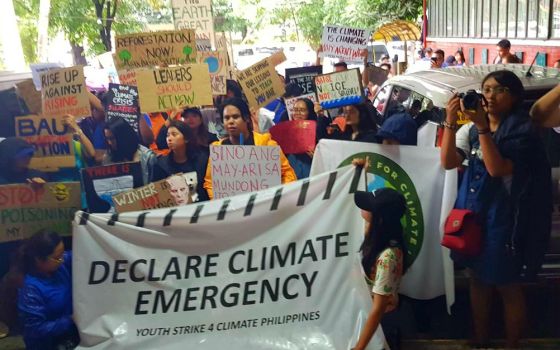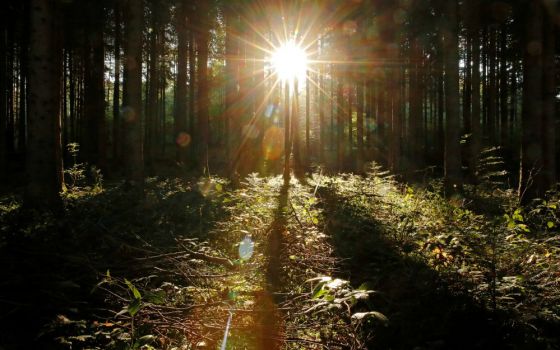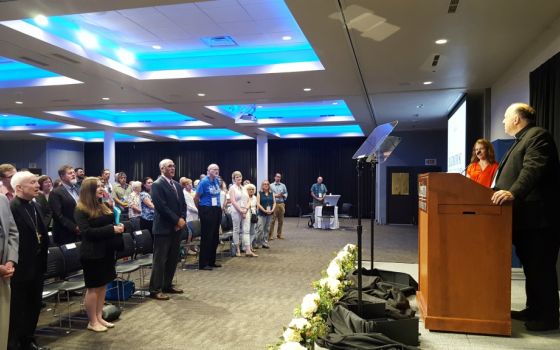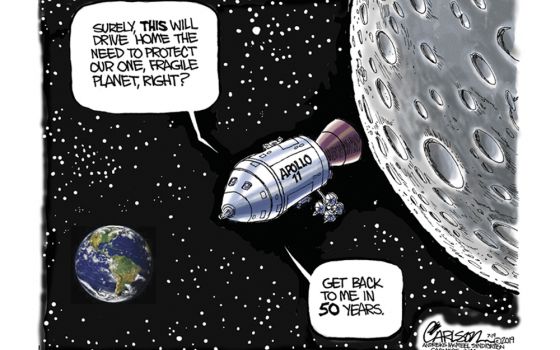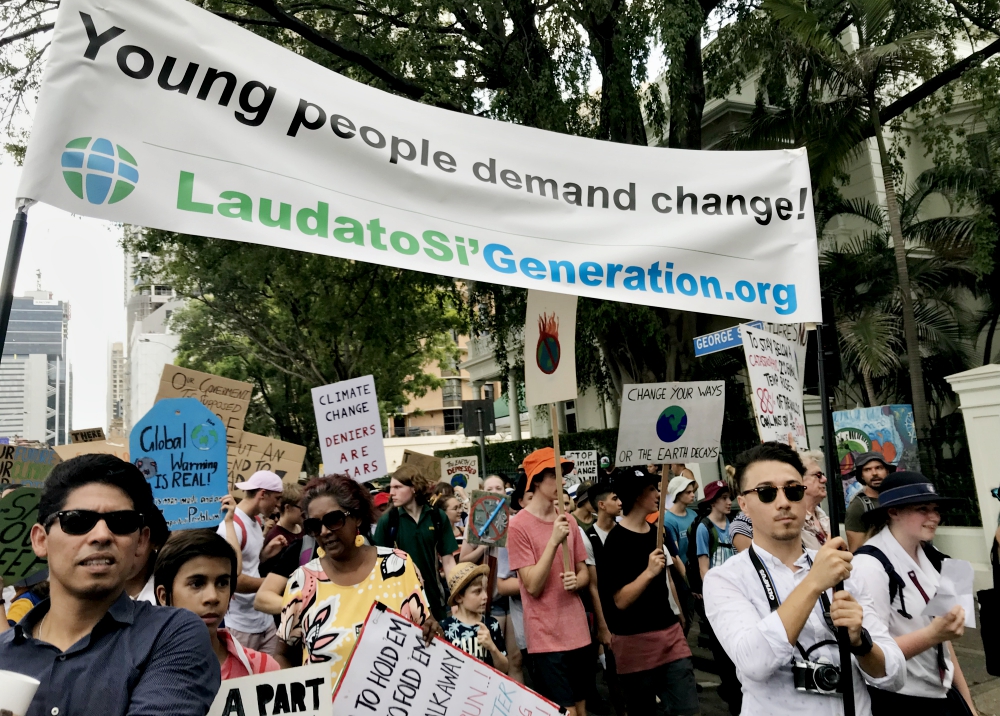
Catholics in Brisbane, Australia, take part in a global climate strike March 15 protesting a lack of action by government leaders in addressing climate change. (Laudato Si' Generation)
Hundreds of thousands of youth and young adults across the globe planned to swap classrooms for protests Friday as part of the latest major school strike against inaction by government leaders on climate change.
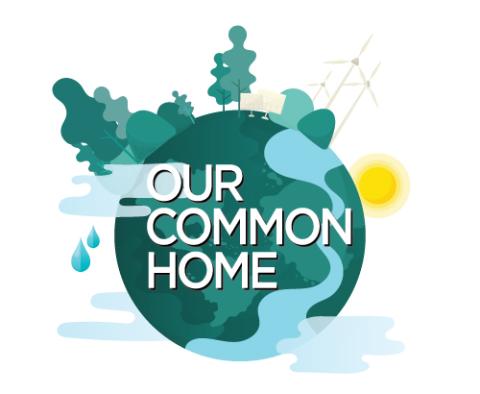
The second global climate strike, following the first in March that drew an estimated 1.4 million people, will include a growing number of young Catholics through a new youth-centered group called Laudato Si' Generation.
It is one of numerous groups organizing the strikes, which happen to align with the fourth anniversary of the publication date of Pope Francis' encyclical on the environment and human ecology, "Laudato Si', on Care for Our Common Home." (The papal document was officially released June 18, 2015.)
Nearly 1,600 strikes in 118 countries were planned for the day, according to Greta Thunberg, the 16-year-old Swede who sparked the #FridaysForFuture climate strikes when she started her solo protest last August. Since then, she has addressed world leaders, including a brief moment with Pope Francis, who encouraged Thunberg to continue her work for climate action.
Laudato Si' Generation has organized as many as 50 strikes set for May 24. The youth organization is calling on the Catholic Church to become a leader on climate change by developing sustainability plans and committing to reduce its own greenhouse gas emissions that continue to warm the planet.
"We want people to be fully aware of Laudato Si' and what Pope Francis is asking us to do. Not only to pray and reflect but take action as well," said 31-year-old Analisa Ramsahai, a member of Laudato Si' Generation and one of the organizers of climate strikes planned in Trinidad and Tobago.
Kids take the lead
On the small Caribbean island nation off the coast of Venezuela, more than 400 children ranging from ages 7 to 18 from 20 Catholic schools were expected to march to the home of Archbishop Charles Jason Gordon of the Port of Spain Archdiocese. There, they planned to deliver a petition asking for ecological curricula and eco-friendly policies around waste and food in their schools.
Representatives for the archbishop, who is out of the country, and the apostolic nuncio were set to receive the petition. Ramsahai, a project coordinator with the Franciscan Institute for Personal and Family Development, a ministry of the Sisters of the Sorrowful Mother, told NCR that church leaders on Trinidad and Tobago have been supportive of the march and many were planning to attend.
"This is a reality that we're all facing — climate crisis, ecological crisis. And children, they're the ones who are going to feel the full brunt of it. And they have started to take the lead. They have started to take action," she said.
In Seattle, members of Laudato Si' Generation were set to join other area environmental groups, including Extinction Rebellion, in their own march to the city’s landmark Space Needle. There, they would hold an 11-minute "die-in" — symbolizing the 11 years that climate scientists have said remain to cut greenhouse gas emissions nearly in half in order to put the planet on pace to limit global warming to 1.5 degrees Celsius (2.7 degrees Fahrenheit), and to avoid catastrophic threats to life that come with higher levels of warming.
That forecast, from the United Nations climate science body, has energized environmental groups, and especially young activists, to increase pressure on world leaders to ramp up climate action plans to meet the goals of the Paris Agreement. In addition to the climate strikes, the Sunrise Movement in the United States has elevated climate change as a prominent issue heading into the 2020 presidential election.
"Others have the greatest responsibility for causing the climate crisis, but my generation and those that follow will bear the burden of its consequences," Maria Agustina Rodriguez Ortiz de Rozas, a Laudato Si' Generation member organizing a strike in Argentina, said in a statement. "Today, we say no more. We’re taking back our future, and this is only the beginning."
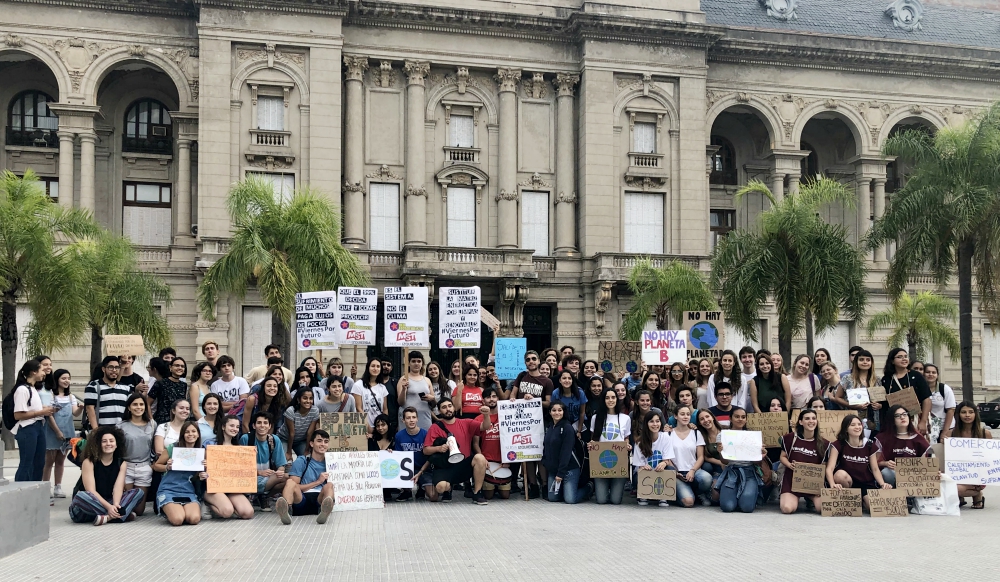
More than 80 young people take part in a global climate strike in Rafaela, Argentina, March 15. Youth with Laudato Si' Generation had planned another protest as part of the second global strike taking place May 24. (Laudato Si' Generation)
"Young people are facing an uncertain future," Fr. Joshtrom Kureethadam, coordinator of the ecology and creation sector of the Vatican's Dicastery for Promoting Integral Human Development, said in offering support of the strikes.
"We encourage decision-makers everywhere to listen to young Catholics' call for urgent and ambitious policy changes to secure a 1.5-degree future," said Kureethadam, author of the recent book The Ten Green Commandments of Laudato Si'.
A youth manifesto
The climate strikes represent the first major initiative of Laudato Si' Generation, the recently launched youth arm of the Global Catholic Climate Movement.
Laudato Si' Generation already has a membership of approximately 2,000 Catholics worldwide, primarily between the ages of 15 and 30. It holds regular webinars and members can join working groups focused on outreach, activism, spirituality and communication.
Marisa Vertrees, organizing director for Global Catholic Climate Movement, said that the idea of a youth branch came from a growing recognition from the movement's own work as well as World Youth Day and the synod on youth.
"There was so much energy among Catholic youth and young adults in taking action on the climate crisis, and so much of a need for them to be given a voice," she said.
Two days before World Youth Day opened in Panama in January, 400 young Catholics gathered to discuss the pope's social encyclical on the environment. That conference produced a youth climate manifesto later presented to Cardinal Luis Tagle, archbishop of Manila, Philippines, and head of Caritas Internationalis.
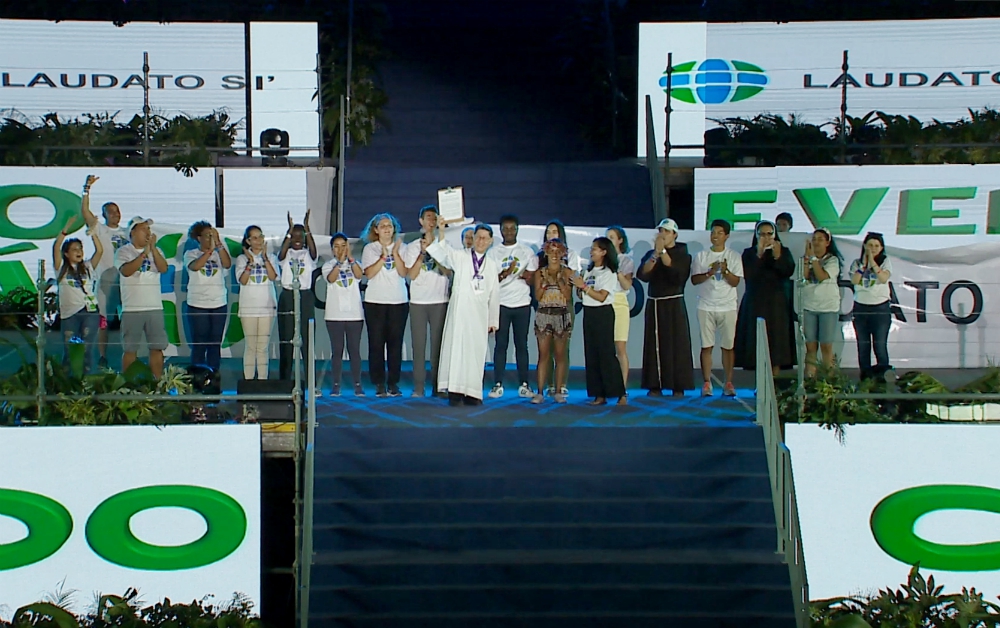
Cardinal Luis Tagle receives the Laudato Si' Generation manifesto during World Youth Day in Panama in January. (Laudato Si' Generation)
It also marked the start of Laudato Si' Generation.
"Our future and the future of those who will come after us is in grave danger," the manifesto begins. "For a long time, humanity has embarked in an irresponsible path of environmental destruction that still makes our present precarious and affects the future."
The youth climate manifesto calls for "ongoing ecological conversion" at all levels of the church, including steps toward promoting simple and sustainable lifestyles, for ecclesial structures to commit to 100% renewable energy by 2030 and to adopt ethical investment guidelines that would divest church finances from fossil fuels.
It also calls on world leaders to meet the Paris Agreement goal of holding global warming to 1.5 C by phasing out fossil fuels; to take concerted steps by 2030 to protect a third of the planet's ecosystems and to provide universal and fair access to drinking water; and to implement the U.N. Global Compact for Safe, Orderly and Regular Migration.
'We all can start caring'
Apart from the climate strikes, education and awareness have been an early focus for Laudato Si' Generation. It is working to develop guidelines for setting up groups on school campuses around the pope’s encyclical.
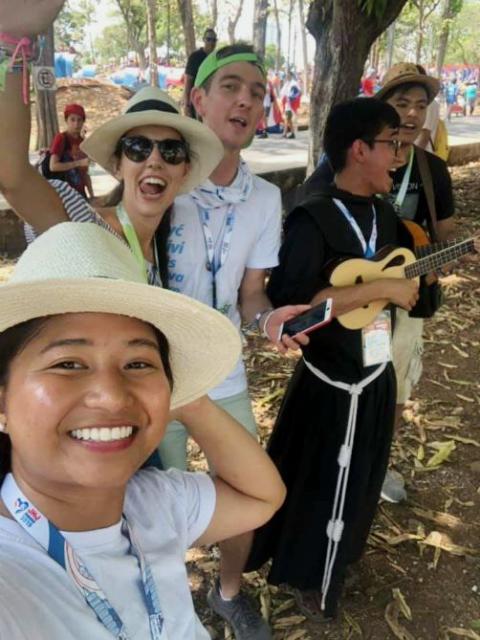
Luke Henkel, center, of Seattle poses with other young Catholics during World Youth Day in Panama in January. (Laudato Si' Generation)
In addition to the strike, young Catholics in Seattle are sending a letter to their bishops and heads of Catholic schools requesting that Laudato Si' be included more fully in curricula and that faith-based ecological programs are offered in schools.
Luke Henkel, an outreach coordinator for Laudato Si' Generation and chair of the creation care team at Seattle's St. James Cathedral, said that while there's a lot of activity in church groups, the power of the encyclical remains somewhat untapped. "There's little awareness of the revolutionary way that the Catholic Church is treating the environmental crisis because of Laudato Si'," he said.
"It doesn't seem like anybody's really connecting the fact that this is where we can really make good change by educating ourselves on what Catholic social teaching is regarding the environment," Henkel, 29, told NCR.
Ramsahai said that while many young people in the Caribbean are "fully aware of the issue of climate change," especially through increasingly devastating hurricanes and extreme temperatures and rainfall, they are less attuned to Catholic teaching on the environment.
In creation care workshops she has led in classrooms throughout the Caribbean, she often begins by highlighting the creation story in the Book of Genesis and the responsibility God gave to humanity to care for the Earth and its ecosystems, she said. When she ties that to scientific data around climate change or plastic pollution in oceans, "they put two and two together."
Ramsahai said students have embraced finding simple ways to make a difference: using a handkerchief rather than paper napkins, creating craft baskets to carry fruits at the market, and seeking new ways to make a popular frozen juice drink that doesn’t involve a disposable plastic bag.
Advertisement
So far, Ramsahai has helped set up a Laudato Si' Generation chapter in St. Lucia and Grenada — which is holding its own climate march May 31 — and there are plans to expand to Dominica and St. Vincent and the Grenadines.
As Laudato Si' Generation expands, its members recognize they can't accomplish their goals outlined in their manifesto alone.
"We need leadership support from all levels — the government, the church especially, and schools — in order to see this foundation grow into something bigger," Ramsahai said.
For Henkel, a former seminarian for the Divine Word Missionaries, he was inspired by the environmental work he witnessed during his time as a missionary in the Philippines, and the passion in Panama at World Youth Day. The big challenge, he told NCR, is cultivating that same energy in the wider church, particularly in the U.S., "to get church leaders to start caring and then saying, 'Hey, we all can start caring, not just Pope Francis.' "
"If young people are seeing that this is what parish priests are talking about, then they'll perk up," he said. "I guess to say it kind of simply, they'll take this stuff a little more seriously."
[Brian Roewe is an NCR staff writer. His email address is broewe@ncronline.org. Follow him on Twitter: @BrianRoewe.]




